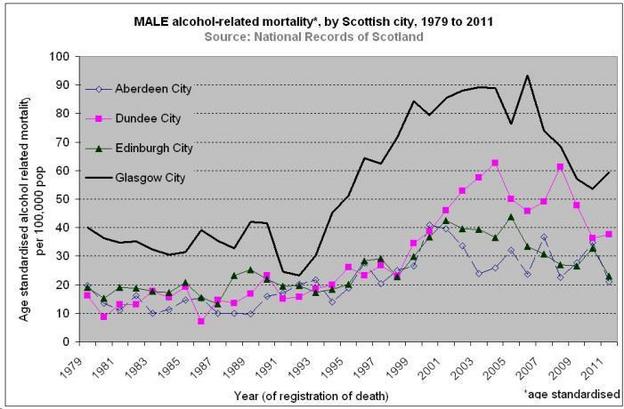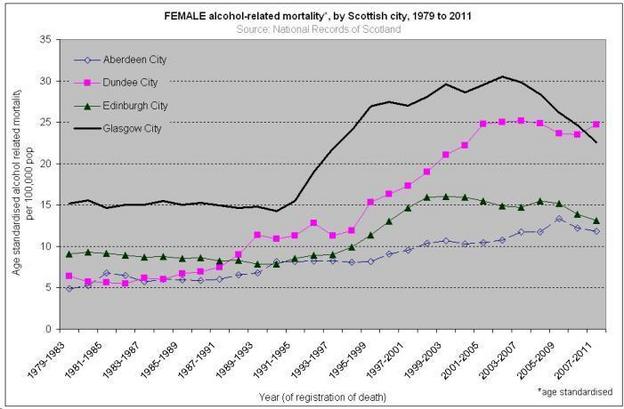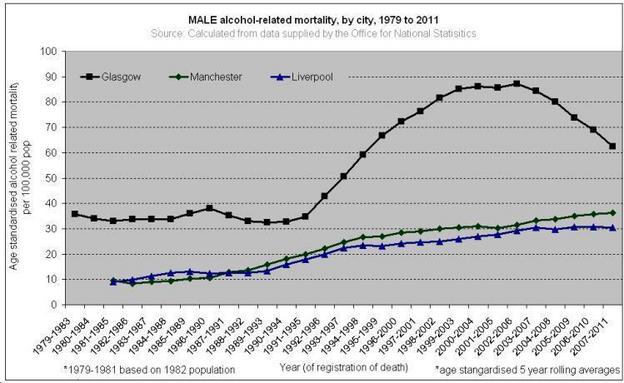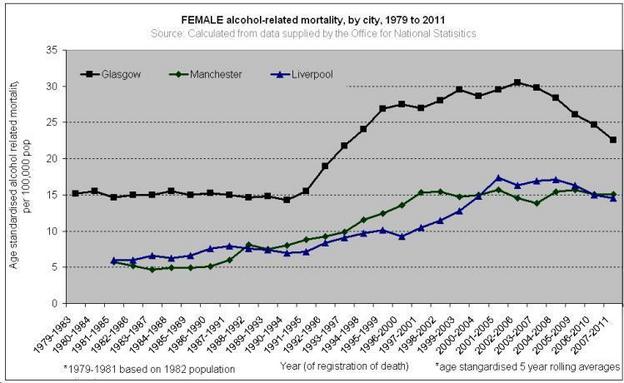Cities comparison of alcohol deaths
Within Scotland:
Male alcohol deaths compared across selected Scottish cities Click on graph to expand
Click on graph to expand
Although the trends in male alcohol related deaths are somewhat different across the Scottish cities examined, alcohol deaths rose in all cities in the 1990s. The rise in Glasgow occurred earlier than the rise in the other cities and rates in men remain highest in Glasgow.
Male alcohol related deaths fell in all cities examined in the 2000s. In Glasgow the fall in deaths stalled in 2010, with rates rising again in 2011.
Female alcohol deaths compared across selected Scottish cities (5 year rolling averages)
Click on graph to expand
[Because of smaller numbers of deaths in women compared to men the above graph shows 5-year rolling averages – i.e. data from 5 year periods are grouped – rather than the single-year rates used for men]
Trends in alcohol related deaths in women were similar to that in men across the Scottish cities examined, in that alcohol related deaths rose in all three cities in the 1990s.
Similarly, alcohol related deaths also decreased in most Scottish cities examined in the 2000s, with the exception of Dundee which now has the highest female alcohol related deaths of the cities examined.
Within the UK:
Male alcohol deaths compared across selected UK cities (5 year rolling averages)
Click on graph to expand
Female alcohol deaths compared across selected UK cities (5 year rolling averages)
Click on graph to expand
Liverpool and Manchester have similar levels of deprivation to Glasgow and share similar histories of industrialisation. However, for both men and women Glasgow has significantly higher levels of alcohol deaths than either Liverpool or Manchester.
Rates of alcohol related deaths rose steadily in Liverpool and Manchester throughout the 1980s and 1990s, contrasting with the picture in Glasgow where alcohol deaths began to rise steeply in the 1990s, before reaching a plateau in the early 2000s and then dropping.
Although the absolute increase in deaths was greater in Glasgow, the relative increases across all three cities since the 1980s was similar.
Notes
The Office for National Statistics (ONS) provides a definition of alcohol related deaths based on the diagnosis on the death certificate. Approximately three quarters of alcohol deaths relate to disease of the liver, a quarter relate to mental health related alcohol conditions resulting in death. The remainder (approximately 3%) relate to diseases of other organs or death resulting from acute intoxication.
Larger numbers of alcohol related deaths are seen in men compared to women, for this reason rates for women are presented as five year rolling averages and rates for men are presented as single year rates.
Additional Resources
-
ResourceWednesday, 11 June 2014
Exploring alcohol-related harm in Glasgow
A new report from the Glasgow Centre for Population Health explores the increasing burden of alcohol related deaths in Glasgow from a local, national and international context. -
ResourceThursday, 26 May 2011
Your Better Life Index
A new, interactive index allowing users to measure and compare their lives. -
ResourceSunday, 1 November 2009
Miniature Glasgow - Video
An extension of the GCPH's work profiling Glasgow's health, produced in collaboration with the International Future Forum. -
ResourceWednesday, 19 August 2009
A Games Legacy for Glasgow
Brochure outlining the potential legacy of Glasgow's role as Commonwealth Games host city in 2014. -
ResourceFriday, 17 July 2009
Views of Health in Glasgow - Video
Originally produced for an international audience at a conference in Pittsburgh, USA, this film provides insights on health concerns and beliefs drawn from interviews with Glaswegians themselves and with a group of health experts. -
ResourceMonday, 3 April 2006
Let Glasgow Flourish
A comprehensive report on health and its determinants in Glasgow and West Central Scotland







